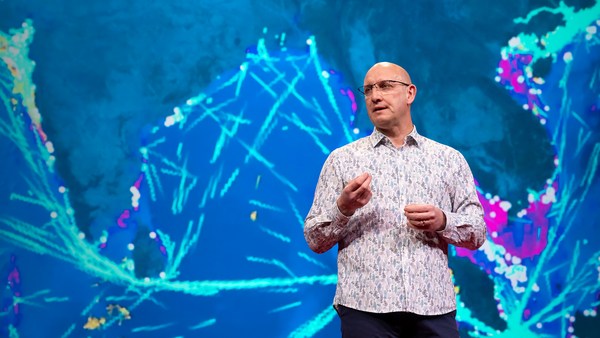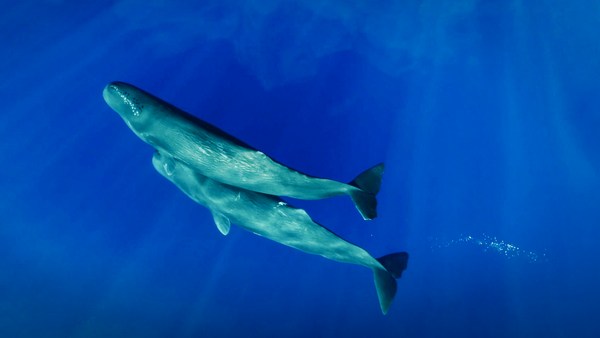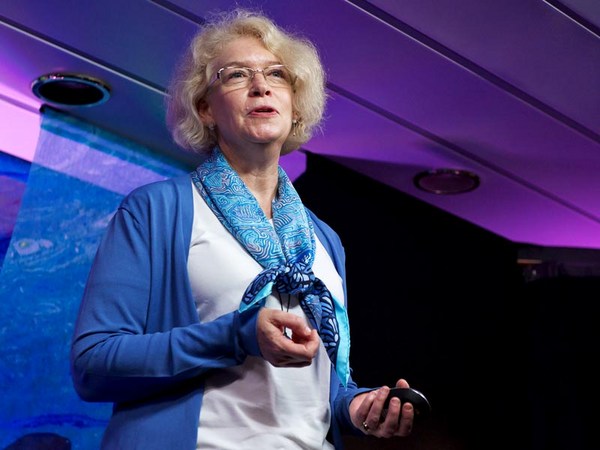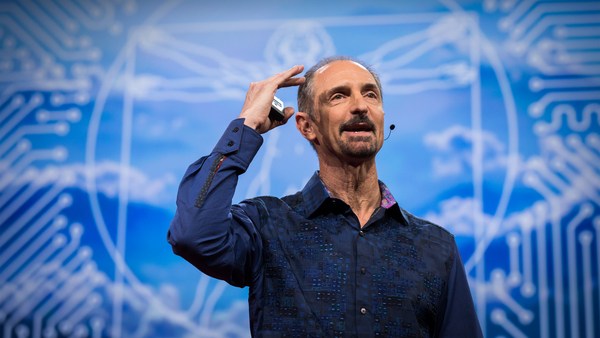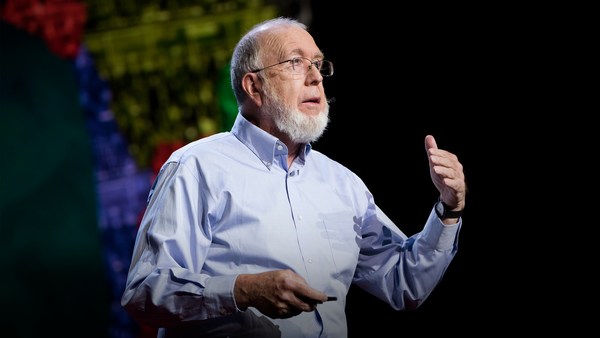I am a scientist, and for a living, I snitch on, profile and investigate ocean crime and its behavior, which for someone who A, cannot swim -- I sink like a needle,
(Laughter)
and B, was born in a small landlocked Algerian village, seems unlikely. Yet here I was, a few years ago in the port of Dakar in Senegal, to investigate a Spanish-owned vessel under the name The Asian Warrior. The vessel was on Interpol's radar for illegal fishing and had escaped Thai custody under the very Spanish name: THAICHAN. The vessel was docked parallel to three other large ships that I needed to cross to board it. But on the first ship, I already noticed three crewmen sitting on the floor, eating nothing but rice. Behind them, their sleeping chamber with cardboard in lieu of mattresses, no blankets, and with a ceiling about as high as a bunch. I could see lots of rust and dead fish piled up in gray water everywhere. I have spent time on ships. It gets cold at night, and if you don't have proper sleep, nutrition and clean water, you will not make it. What I was seeing there were indicators of a crime we call modern-day slavery or forced labor.
Over the years, I've counted nearly 50 different types of ocean crimes like this one, ranging from drunk driving or navigating to illegal fishing, drug trafficking, wildlife smuggling, terrorism and murder. And most of these crimes happen out of sight of any authorities. You can literally take a selfie of yourself shooting someone in the high seas without any fear. This is a photo that I took from a video, a widely circulated video, that was showing people swimming in the ocean, being shot at from a boat while trying to escape. The only reason we know of its existence is because the owner of the phone who took the selfie forgot it in a cab in Fiji, and the cab driver gave it to the authorities.
Oceans cover two thirds of the planet's surface. There are nearly 4.6 million vessels out there, and of that, we only have visibility into the activity of about two percent. This lack of visibility is exploited by criminals and provides perfect cover for their illicit operations. These unseen activities, in turn, have huge impacts on what happens in our own backyards, on land.
In Vancouver, where I live, money laundering from maritime drug trafficking has contributed immensely to increasing the cost of real estate. How? It's quite simple. Here's a recipe. Gains from drug trafficking have to be laundered somehow to be injected into legit markets. And one of the best ways of doing that is buying real estate and inflating the price. That's what the Chinese triads have done in the city, by injecting over four billion dollars into our real estate. But it's also happening in other places like Missouri and Kansas, and places known for their luxurious lifestyle, such as Dubai.
And it's not just real estate. Take the drug crisis in the United States, here in our own backyards here, where drug overdose is the number one cause of youth death, beating cancer and gun violence. In fact, illicit drug users in the United States spent 150 billion dollars on illicit drugs. Drugs enter the country by land, by air and by sea. Over 9.2 million shipping containers filled with narcotics still reach American coast, beaches and ports every single year. From Mexico, yes, but also from other places in the world far away, like Myanmar in Southeast Asia and even Afghanistan. Current efforts like random patrolling or the opportunistic use of human intelligence do little to stop the flood of narcotics. We still use these outdated policing techniques -- no, it's not CSI -- and basic enforcement models, while criminals are the ones who are actually using CSI. They are adept in using technology to always be ahead. The Spanish mafia uses autonomous submarines to provide logistical support to drug traffickers. Embargo-violating fuel smugglers in the Indian Ocean will use sat phones to communicate their whereabouts to their clients. Pirates. It's quite ironic, because when I say I'm a crime fighter, they say, "Do you chase pirates?" Actually, pirates use satellite systems to detect vessels, chase them down and capture them for ransom. Intercepting drugs on transit before they can even reach our shores could help curtail the health crisis in the US and allow me to maybe one day, hopefully, buy a house in Vancouver.
(Laughter)
And in order to do that, we need to transition from reactive to proactive enforcement. For example, we can create a criminal record for vessels, their owners, their operators. Yes, we still don't have that. And strategize enforcement based on that intel. So my business partner Sogol and I, created Hava, a powerful artificial intelligence investigator that uses 650,000 keyword combinations in the 23 most spoken languages in the world to do one single thing: bust these criminals.
(Applause)
The program first looks for crimes online in all available databases, ranging from simple press releases by coast guards to Interpol notices, figures out who's involved, identifies their location, ship routes, identities and criminal networks. To build the system or the tech, we spoke to ethicists to reduce bias. We consulted with law enforcement to understand the gaps. We even, I was going to say partnered, we spoke to criminals to --
(Laughter)
Learn how they can get away with crime. If I wanted to be a criminal, I would be a really great one now.
(Laughter)
The whole idea is to adopt a vessel of concern approach. It means we see it when a dangerous, potentially criminal vessel is entering our waters, or when a shady company wants to do business with us. Right now we can see some of these ships, what they're doing, where they're going. But we don't know what's happening on these ships or what they may be up to, much like profiling a known person of interest -- now that's CSI -- or knowing when a dangerous, potentially and repeat sex offender is back in town. Hava gives us the ability to see, on a map, high-risk ships, even when they look innocent on the surface.
Using this approach in 2022, Madagascar refused fishing licenses to Chinese vessels with a criminal record. A number of Spanish companies are now in murky waters, no pun intended, after their illegal fishing activities and labor offenses were uncovered earlier this year in Senegal. Hava also gives us information on networks or criminal networks who did not have before. And boy, we need them.
Take the vessel Fu Yuan Yu 831, which was caught in Indonesia on multiple charges and was flying multiple flags. The owner of the vessel, who was a Chinese elected congressman, did his best to cover his involvement by creating a very complicated ownership network for the vessel. The Fu Yuan Yu 831, which came all the way from China, was apparently owned by a shell company based in Timor-Leste, which in turn was partly owned by a Chinese state-owned company. And that's when that congressman comes into play. Convoluted, right? But it's very common to use complicated networks to get away with crimes.
We have been navigating solutions to maritime crimes for decades now, and they tend to be one-size-fits-all. Stop eating fish to save the ocean. Send more boats at sea to stop the flow of migrations. Close down the borders and build walls to reduce drug trafficking. Yeah, they won't work. In fact, maritime crimes such as illegal fishing and drug trafficking have tripled in the past 10 years. Over the 15 years that I've been doing this work with agencies, fishermen, criminals and many others, technology helps to tackle crime to save time, save money, but also share knowledge and build bridges to achieve the common goal of protecting our oceans, our youth and our backyards.
But it only ever worked when people were fully involved in the process. Technology is powerful, but it lacks the nuanced understanding, knowledge and networks stored in our individual human minds. In the case of the investigation on the Spanish companies operating in Senegal, technology showed us where the vessels were, at what speed they were operating, their identities. But we still needed to talk to fishermen to understand the unspoken political context in order for us to make sense of that. Technology needs us to fill the gaps and to limit misrepresentations and bias. In Thailand, interviews revealed that 25 percent, that's a quarter, of all fishing laborers were worked between 17 to 24 hours a day, nonstop. So when we catch an illegal fishing vessel or when we see it, and we are about to criminalize the crew and arrest them, we always need to remember that they may be in a situation of human trafficking or forced labor. We always need a human approach to complement the technology to target the right criminals. Because what we see does not tell the whole story. To meaningfully detect crime and stop it, human creativity and technological progress have to always go hand in hand.
Thank you.
(Applause)
